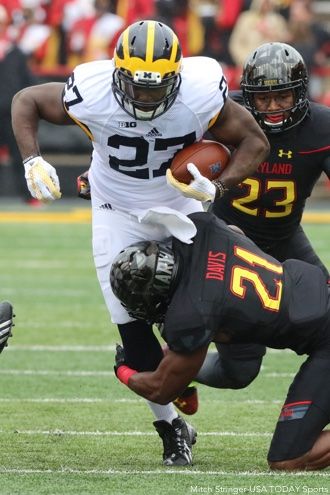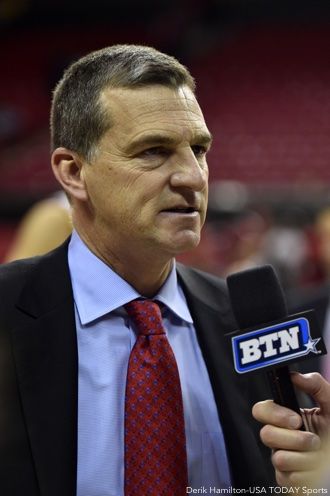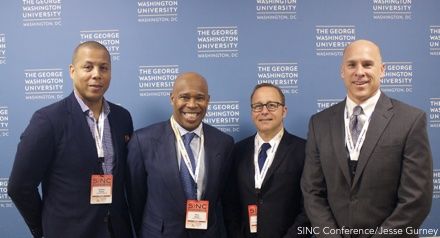Damon Evans is currently a Maryland man. It is a role he could not have imagined six years ago. Evans was hired as Maryland's senior associate athletics director/CFO in November 2014. He had been athletic director from 2004-2010 at Georgia, his alma mater. Evans, a four-year starting receiver for the Bulldogs, earned his bachelor's degree in finance in 1992 and a master's degree of education in sports management, also from Georgia, in 1994. Evans resigned from his job in Athens after a DUI arrest. After speaking at George Washington University's SINC Conference, Evans sat down with ThePostGame to put Maryland's first year and a half in the Big Ten into perspective. The Terrapins moved from the ACC mere months before Evans' arrival.
ThePostGame: What's the overall reaction to the Big Ten move so far?
DAMON EVANS: People are excited. Initially, when the move was made, there were some people like, "What are we doing?" But they've seen us move in. We've been highly competitive in the league. They've seen the return by us for being in the Big Ten, and now, we started making our own rivalries. When you start getting Ohio States in to your venue and the Michigans, people are getting excited about that. All in all, we've won a lot of conference championships, we've competed extremely well. We've been able to do some things because of the financial resources we've gained, so it's been good for the University of Maryland, as well as our fans.
TPG: You mention the financial resources. How is the Big Ten different than the ACC in that way?
EVANS: Really, what happens is the conference network. Jim Delany and his vision, it's a mastermind. Putting the [Big Ten] Network together, the way it's been set up, that's allowed the Big Ten to get into a lot of different television markets by bringing the University of Maryland in, by bringing Rutgers in, and when you're in good television markets, it helps draw in revenue. When you can bump up that revenue, the distribution from the Big Ten to its member institutions is significant. The ACC had a great payout, but one of the main reasons we moved was the revenue we could generate as a member [of the Big Ten].
TPG: The Big Ten is more of a football conference, while the ACC could be considered more of a basketball conference. How has that changed your mindset in terms of promoting your sports?
EVANS: We want to promote all our sports in the right manner. Maryland's a great basketball institution. I never want to lose sight of that. What coach [Mark] Turgeon's doing right now ... the tradition of men's and women's basketball ... if you look at women's basketball, we're good in lacrosse, we're good in field hockey. But there's no doubt, in the Big Ten, football is significant, and we know we have to make some improvements in that area. As you saw, we made a change in our head coach. We're excited about D.J. Durkin. And we know from a facilities and a resources perspective that we've got to step up our game at the sport of football to be able to compete at that level. We're competing against institutions like Ohio State, Michigan State and Penn State, which have incredible resources. We've got to continue to move in that direction and we believe we can be a major player in the football space.

TPG: There are fans who say Maryland is traditionally an ACC school and now you've lost rivalries against schools like Duke and North Carolina -- although, you did visit North Carolina this year in basketball -- how have you dealt with calming the fan reaction of leaving the ACC?
EVANS: I can understand their concerns. Those are great rivalries. You're talking about UNC, Duke and some of the other schools in the ACC. The ACC's a great conference, a very respectable conference, and when you're used to certain things, change is always difficult for people. But what I've seen is as we've gone through this transition, more people have gotten onboard. When you're seeing those other institutions come in, you say, OK, we've got a Michigan, we've got an Ohio State, we've got a Penn State, we've got Nebraska and Wisconsin, people are going, "OK, these institutions are pretty good too." Now we're starting some new traditions, some new rivalries. That has helped ease the transition. Also, winning and having some success. When you have success, people are satisfied, and we've been able to do that.
TPG: If you told people in Georgia, no more Florida, no more SEC, how do you think they would react to that?
EVANS: (Laughs) People would be up in arms just like at the beginning of this. Conference realignment, that's one of the things you have to think about: Are you willing to give up those natural rivalries you have? There's no doubt in the SEC, people would say, "What are you doing? Where are you going?" When you make those decisions, you don't make them lightly. You make sure you've looked at everything and make sure you're trying to move the institution in the right direction. You make sure you have some success at the beginning and you could continue to build and your fan base and alums can see you reap the benefits. I think we've reaped the benefits.
TPG: How did your experience in the SEC make you right for this role at Maryland?
EVANS: I've known Kevin Anderson for a long time. We're good friends. I've followed his career. Obviously, he's done a tremendous job in his career, a tremendous job at Maryland. The decisions that he's tackled, the move to the Big Ten, which was significant for the university, as well, but my skill set, having been in another conference that's highly competitive, across the board, helps. Being at an institution that's highly competitive, with the resources that helped us put a good program on the field, having the background in football that I have, because in the SEC, football is big. My skill set of being a former athletic director at a Power Five institution, understanding the climate associated with that, has helped me come in and assist Kevin with his vision and goals. It was a smooth transition because I understood that world.

TPG: You talked about pay for play a little on your panel. What's your opinion on that?
EVANS: I'm not one who is in favor of pay for play. The experience student-athletes gain is significant. The value of the education is understated. We don't talk about what that value is. Now I do think there are some things we can do to make the experience better. The moving to the cost of attendance was a step in the right direction. Now we've got fueling stations, we're providing unlimited meals. I think there's some other things to do down the road. We've got to remember what makes us great and what makes us unique is that we are an amateur sport compared to the rest of the world. My concern is if we keep going too far down that road it totally changes our game and now, we may really need to shift how we continue to evolve as an NCAA.
TPG: What's your biggest goal you want to accomplish?
EVANS: At the end of the day, I'm always about the student-athlete. If there's a young man or woman and when they leave that institution, they feel connected and they know we did everything we can to help them out and prepare them, that's the thing for me. That's why I got into the business. Being a former student-athlete at Georgia, I'm sitting on the field one day, as a business major, I said I want to be able to impact the lives of student-athlete. How can I be most impactful? By becoming an athletic director -- rules changes, engaging student-athletes, engaging donors and fans. I want to continue to impact student-athletes. I know people may say that sounds cliché, but that's why I do it. I like being around young people. I get to go back to Maryland today, and if I get bored in my office, I can go down to a basketball practice, I can go over to the football offices, I can go over and watch field hockey or lacrosse. They keep me young and keep me energized, and for that, I believe we owe them.
-- Follow Jeffrey Eisenband on Twitter @JeffEisenband.





















